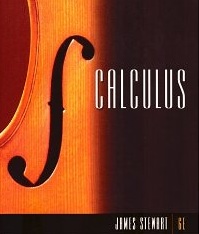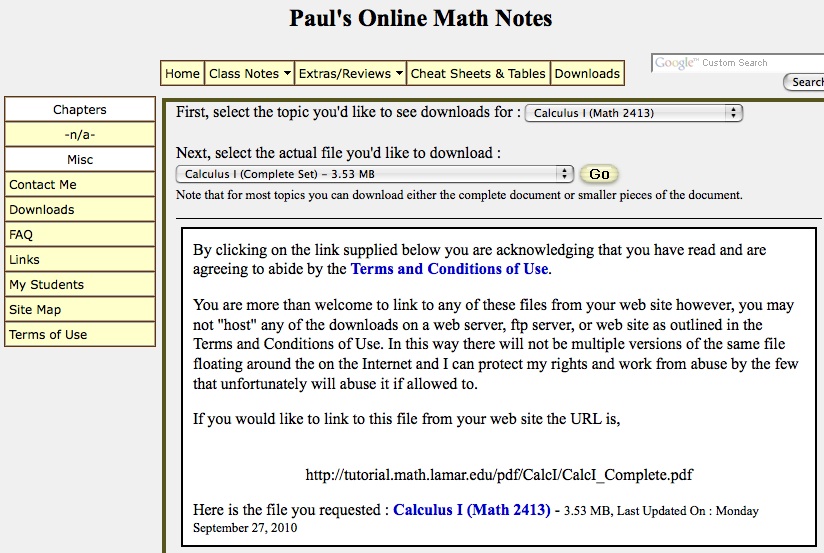When academic textbook prices drop to $0.00 what will publishers do?
Posted by: Gary Ernest Davis on: October 6, 2010
Technology is like a universal acid to societal norms – it eats away away at all existing structures and modes of operation. People have lost jobs because technology has put them out of work, just as technology has created new jobs for others. Work, business and education are in high states of flux as more and more human activities are impacted by technology. And the pace is picking up, not slowing.
College students presently pay very high prices for text books.
This semester I am teaching Calculus 3, and the book the Department of Mathematics chose for our calculus sequence is by James Stewart, published by Brooks Cole and into its 6th edition. It’s priced at $224.95 (amazon.com price $165.45 + postage, at time of writing) and is a large book at 1344 pages. That works out at a little under 17 cents per page for the publisher’s list price and a little over 12 cents per page for the amazon.com price. The per page cost may not be excessive, but the initial cost is high for many college students or their parents. This is a book that is used for 3 semesters, so one might argue that at around $75 per semester it’s not overly expensive.
The other course I am teaching this semester is differential equations. A book I like as do many of my colleagues is Differential Equations: A Contemporary Approach by Paul Blanchard, Robert L. Devaney, Jong-Eao Lee Glen R. Hall, and Jong-Eao Lee. It is currently priced at $148.44 +postage on amazon.com. Instead I chose as a text this year Ordinary Differential Equations by Morris Tenenbaum and Harry Pollard, published by Dover Books, listed at $24.95 and currently $16.47 + postage on amazon.com
Another colleague and I work to find good texts at low prices.
Some months back this got me to thinking about how we might reduce the price of mathematics texts to very low prices – to $0.00 in fact.
One way to do this is for academic authors to simply give their books or notes away: to make them freely available to students in electronic format, as pdf or html files. Authors who do this are not going to get rich from royalties this way, but do it because they feel a responsibility of care for students. A stunning example of this – but by no means unique – is Paul’s Online Math Notes, where you can find beautifully written accounts of Algebra, Calculus I, II, II, Linear Algebra and Differential Equations.
As I thought about this issue it struck me that placing advertisements in text books might be a way to reduce the price to $0.00. Advertisers could obtain audited sales figures, and ads could be targeted to a well-defined audience. As I thought about this idea I came across bookboon.com who have already implemented it!
Open source textbooks are increasing in availability but have not yet really begun to take over from the high priced commercial texts. One reason for this, in my view, is that teachers – school and college – are addicted to the newest shiniest editions of texts pumped out by publishers. New editions appear every few years and students are told fairy tales such as “You need the new edition because the homework for chapter 3 is on a different page.”
The capitalist system is great when it works. It’s not great when publishers and authors are getting rich at the expense of students and their parents. Most students don’t want the texts they buy – they are told they have to buy them. It’s a captive market, and the teachers are cooperating with publishers to keep students enslaved to this expensive system.
The single biggest technology issue that will change this state of affairs, in my view, is cheap or open source homework grading systems that are relevant to a wide range of texts. Teachers care much more about not grading homework than they do about shiny new editions of text books. Current online homework grading systems for mathematics are relatively cheaper than textbooks – $37Â for Stewart’s Calculus. But if textbook prices were forced to fall you can bet prices for online grading systems would rise.
Advertisements in books can, and my guess is will, bring the price of textbooks down to $0.00. Then publishers will move – as they already are doing – into other profitable areas such as online grading systems, and videos of exemplary teaching.
It will take intelligence and skilled programming to produce an online grading system for mathematics that could grade across a variety of text sources and topics. Yet it could be done. In my view it should be done for the sake of care for our students.
6 Responses to "When academic textbook prices drop to $0.00 what will publishers do?"
The more primative method of grading will never lose its value. An intelligent, thinking human who knows a particular piece of subject matter can evaluate students’ work and learn just how the each student is performing and learn just how is the students’ knowledge and progress. This intelligent, thinking person is either the professor, instructor, or teaching-assistant, or any or all of these. Whether some online homework grading system is developed, the intelligent, thinking, professional person will still be more important than the online computerized homework grading system.
Some hints about that may be these:
People, not computers, write textbooks.
Teachers can both give subject matter advice and career and coursework advice while computer systems may at best hold referenced technical information.
People write letters of recommendation or verification, not computers
I’m not sure what point you’re trying to make here. The fact is that most teachers of mathematics find grading the most onerous part of their job. Computerized grading systems are now commonly in use. This does not take away the responsibility or actual task of instructors discussing homework solutions with students – this is the real people part of the job.
Are you thinking of something along the lines of Webwork (webwork.maa.org) or MyMathLab for the grading system you mention?
I was thinking more of an open source system that was flexible and adaptive to different texts and contexts: something that could learn from an instructor’s text and generate problems and grade them appropriately. This is probably science fiction, yet I hope that through enough people talking and thinking about it that it might become a reality.




October 6, 2010 at 10:15 pm
I mostly agree with you, except that the homework grading system you discuss at the end seems to be more like wild thinking, or sarcasm. Still, the point of most of your discussion is well felt.
On some occasions, students are not forced to use the latest textbook editions, since some students find previous editions which work just fine. Page adjustments and sharing textbook information with other students is possible.
Think about another way that book publishers are increasing the prices of their books: The two, or three, or sometimes more CDs and DVDs that come packaged with so many of the textbooks. Did we need these items twenty and thirty years ago in order to help a book be valuable? No. The books were well written, well designed (yes, often enough), and students read, though, and did exercises from the books. These days, the authors and publishers want to keep with current novel fashion and pump in a few CDs to show how up-to-date with modern technology they are – and nice excuse to increase the price of the textbook package. My own preference is include an optional students’ solutions manual and maybe an additional OPTION of one or two CD/DVDs.
October 7, 2010 at 6:18 am
The homework system I discussed was neither wild thinking nor sarcasm. I suspect it will come to be before too long. As I wrote at the beginning of the post, technology is breaking up old ways of thinking and old ways of doing some things. If we can conceive it, someone will, eventually, do it, like it or not. The question is how do we adapt, and how do we utilize the results of technology in the best interests of our students?